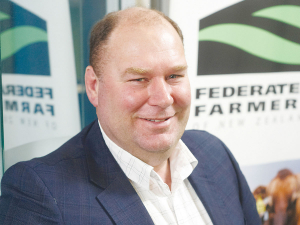Editorial: RMA reforms uproar
OPINION: The euphoria over the Government’s two new bills to replace the broken Resource Management Act is over.
 Fed Farmers president Andrew Hoggard is asking Environment Minister David Parker to promptly amend the RMA to enable cycloneaffected farmers and growers to undertake remedial work.
Fed Farmers president Andrew Hoggard is asking Environment Minister David Parker to promptly amend the RMA to enable cycloneaffected farmers and growers to undertake remedial work.
Federated Farmers says it is pleased that Horizons Regional Council (Manawatu-Whanganui) has recognised the need to get work done on-farm by empowering them to fix infrastructure without getting consents.
"Common sense rather than red tape and costs, is what will speed the recovery of the food and fibre sector in cyclone-hit districts," Feds Tararua president Sally Dryland says.
Horizons had earlier posted advice about only allowing "like for like" replacement of culverts without consent, but advocacy from Dryland resulted in a quick policy U-turn.
The council's advice now is that, where infrastructure such as farm bridges and culverts had been damaged or destroyed, these can be replaced without the need for resource consent on the basis they are repaired or reinstated on a like for like basis. Culverts can also be replaced at a bigger size.
Dryaland said that it's all about building back better and smarter. "Why would you replace a culvert with the same sized one if it's just been washed away? No one wants to replace infrastructure with something that is destined to fail again in the next weather event."
Up until last year, farmers were empowered to put in things lie a culvert without needing a consent.
"That's what's needed to speed the recovery," Dryland said. "Let's not stop the right thing from happening because a ticket collector with a clipboard hasn't been onto the farm to see."
Meanwhile, Federated Farmers NZ president Andrew Hoggard has asked Environment Minister David Parker to promptly amend the Resource Management Act (RMA) to enable cyclone-affected farmers and growers to undertake remedial work that may be in breach of district or regional regulatory requirements, along similar lines to that provided to farmers following the Hurunui/Kaikōura earthquakes. Such works became a permitted activity, with modified notification requirements.
While the RMA provides some relief from normal requirements during and immediately following emergencies/adverse events, Hoggard said this will not cover all the urgent work that needs to be undertaken to restore farmers' and growers' operations.
"That legislation in the wake of the earthquakes was very helpful. Given the severity of the impact of the cyclones, with devastation to the land that appears to exceed that of the Christchurch earthquakes, the usual time-consuming RMA processes will impede progress."
Hawke's Bay apple grower Taylor Corporation says a standout 2026 season, coming after a few difficult years, is boosting optimism among growers.
Horticulture New Zealand (HortNZ) has added its perspective to numerous primary sector voices urging the Government to strengthen its draft legislation to replace the Resource Management Act (RMA).
The Commerce Commission has finalised new information disclosure requirements for local councils and water organisations that deliver water supply and wastewater services.
Beef + Lamb NZ (B+LNZ) is calling for significant changes to the Government’s reforms to the Resource Management Act (RMA).
NZPork says the Government needs to strengthen its proposed planning laws to ensure New Zealand's pig farmers can continue to produce pork.
Good news for kiwifruit growers - a record crop with forecast per hectare returns at record levels for all fruit categories for the 2025-26 season.

OPINION: The proverbial has really hit the fan in Wellington and exposed a glaring example of a double standard in…
OPINION: Dark suited spin doctors exist to, well, spin, and the nice cuddly progressive types at Greenpeace Aotearoa practice this…